
In the first global study of death associated with longer working hours, the World Health Organization and the International Labour Organization found that long working hours led to 745,000 deaths from stroke and ischemic heart disease in 2016, marking a 29 percent increase since 2000.
The study, which was published Monday in Environmental International, showed that working 55 or more hours per week is associated with an estimated 35 percent higher risk of a stroke and a 17 percent higher risk of dying from ischemic heart disease, compared to working 35-40 hours a week.
WHO and ILO conclude that this work-related disease burden is particularly significant in men (72 percent of deaths occurred among males), people living in the Western Pacific and South-East Asia regions, and middle-aged or older workers. Most of the deaths recorded were among people dying aged 60-79 years, who had worked for 55 hours or more per week between the ages of 45 and 74 years.
The report arrives as the COVID-19 pandemic continues to shine a spotlight on managing working hours.
“The COVID-19 pandemic has significantly changed the way many people work,“ said Dr Tedros Adhanom Ghebreyesus, WHO Director-General. “Teleworking has become the norm in many industries, often blurring the boundaries between home and work. In addition, many businesses have been forced to scale back or shut down operations to save money, and people who are still on the payroll end up working longer hours. No job is worth the risk of stroke or heart disease. Governments, employers and workers need to work together to agree on limits to protect the health of workers.”
Dr Maria Neira, Director of the Department of Environment, Climate Change and Health at the World Health Organization, also stressed the importance of scaling back work hours.
“Working 55 hours or more per week is a serious health hazard,” Neira said. “It’s time that we all, governments, employers, and employees wake up to the fact that long working hours can lead to premature death.”

